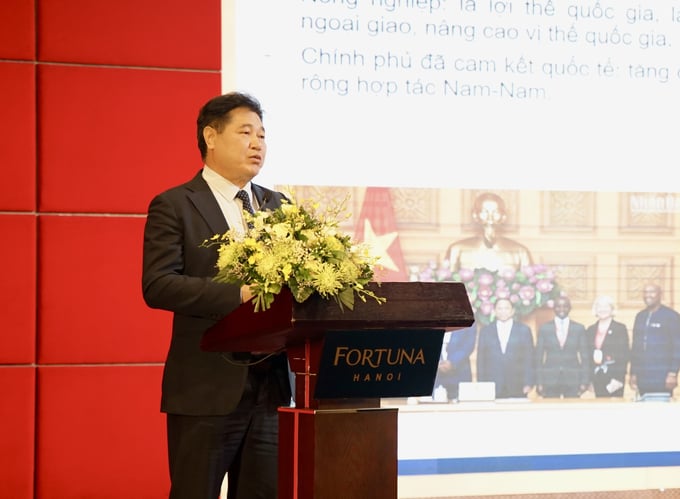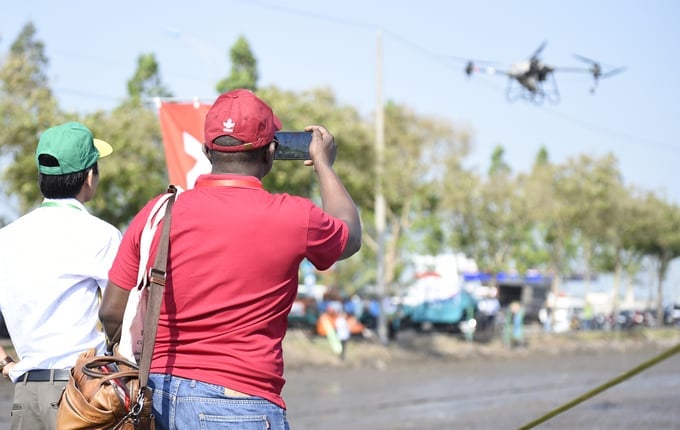May 20, 2025 | 19:57 GMT +7
May 20, 2025 | 19:57 GMT +7
Hotline: 0913.378.918
May 20, 2025 | 19:57 GMT +7
Hotline: 0913.378.918

The Director of the National Agricultural Extension Center (NAEC) is confident that Vietnam will be ready to offer technical advancements and experts to African countries. Photo: Linh Linh.
Ass.Prof. Dr. Le Quoc Thanh, Director of NAEC, stated at the South-South Cooperation event on July 25 that cooperation is a critical foundation for attaining sustainable development objectives. A number of nations, including Africa, share this aspiration and objective.
According to Thanh, Vietnam is a model for agricultural development and is becoming an increasingly significant node in the global supply chain. At the same time, Vietnam has been gaining the trust of African countries in its agricultural cooperation prospects to guarantee food security.
Vietnam's government has prioritized South-South Cooperation, which has garnered the active participation of numerous levels and departments. In spite of the years of implementation, the collaboration has encountered certain constraints, as Thanh observed.
The absence of a management focal point was one of the most significant challenges, as the NAEC Director emphasized. The International Cooperation Department of MARD proposed the South-South Cooperation Office, which is currently awaiting sanction.
In addition to the focal agency, Thanh identified four additional challenges, including the fact that stakeholders have not yet developed a methodological strategy for sustainable agricultural model exports. These challenges include the need to communicate Vietnam's agricultural achievements to the global community, specifically in experts, techniques, technologies, and production organization.
The coordination between ministries, departments, and localities in the implementation of the cooperation agreement remains untight, and the expert groups still need to be trained methodically and systematically. The connection and opening of markets for Vietnamese agricultural products, agricultural business investment, and national image have not yet been associated with the role and effectiveness of cooperation.

t is imperative that we establish a South-South cooperation strategy in the agricultural sector to guarantee the sustainability of development and climate change resilience, as well as to establish and ensure the standardization of programs on experts, techniques, technologies, and production organizations. Photo: Quynh Chi.
From the issues, Ass.Prof. Dr. Le Quoc Thanh suggested several solutions for cooperation, including prioritizing traditional partners with agricultural potential, stable political and security status, expanding private and enterprise cooperation, building a suitable cooperation model that matches the characteristics of each country, and adopting the experience of countries with agricultural development.
Thanh stated, "It is imperative that we establish a South-South cooperation strategy in the agricultural sector to guarantee the sustainability of development and climate change resilience, as well as to establish and ensure the standardization of programs on experts, techniques, technologies, and production organizations. Additionally, we should encourage the private sector to participate in agricultural cooperation."
Vietnam's agricultural extension system and network of institutes have been established over more than thirty years of robust agricultural development. Mr. Thanh believes that these teams should unite to advance South-South cooperation cooperatively.
The National Agricultural Extension Center Director stated: "Vietnam's approach to Africa is not solely focused on production models; it also involves the transfer of comprehensive technology packages that address agriculture, farmers, and rural areas. He emphasized that Vietnam's experience is not limited to promoting technology; it also involves enhancing aspects related to indigenous culture, value chains, and production linkages".
Vietnam has effectively integrated agricultural production duties into national target programs, which include sustainable poverty reduction and new rural development. Agricultural experts have suggested that these activities be incorporated into South-South cooperation.
In particular, Vietnamese professionals who are assisting Africa require further training in the areas of language and culture in order to satisfy the new requirements. These experts can only provide effective solutions to farmers in remote areas by completely comprehending the cultivation practices and habits of the local population.
Mr. Thanh considered South-South cooperation to be a significant issue that necessitated comprehensive solutions. He suggested that Vietnam's future involvement should not be restricted to the transfer of rice cultivation techniques or the construction of individual models, but should also include the organization of implementation.
The agricultural extension system, which is staffed by over 30,000 extension personnel nationwide, is a contributing factor to Vietnam's agricultural production success. These individuals are in close contact with their communities, providing direct guidance to producers. Mr. Thanh observed that the technology would be returned to the instructors upon the project's conclusion in their absence.
Translated by Linh Linh

(VAN) Dong Thap farmers attained an average profit margin of 64% during the summer-autumn 2024 crop (first season), while An Giang and Kien Giang farmers followed with 56% and 54%, respectively.

(VAN) As a doctoral student doing research on renewable energy and electrification at Harvard University, the author shares his musings on electricity, nature, and countryside memories.

(VAN) The decree on Extended Producer Responsibility (EPR) ensures transparent management and disbursement of support funds, avoiding the creation of a “give-and-take” mechanism.

(VAN) Hue City rigorously enforces regulations regarding marine fishing and resource exploitation, with a particular emphasis on the monitoring of fishing vessels to prevent illegal, unreported, and unregulated (IUU) fishing.

(VAN) Hanoi People's Committee has issued a plan on reducing greenhouse gas emissions in the waste management sector with 2030 vision.

(VAN) Vietnam's draft amendment to Decree No. 156 proposes a mechanism for medicinal herb farming under forest canopies, linking economic development to population retention and the sustainable protection and development of forests.

(VAN) In reality, many craft village models combined with tourism in Son La have proven effective, bringing significant economic benefits to rural communities.